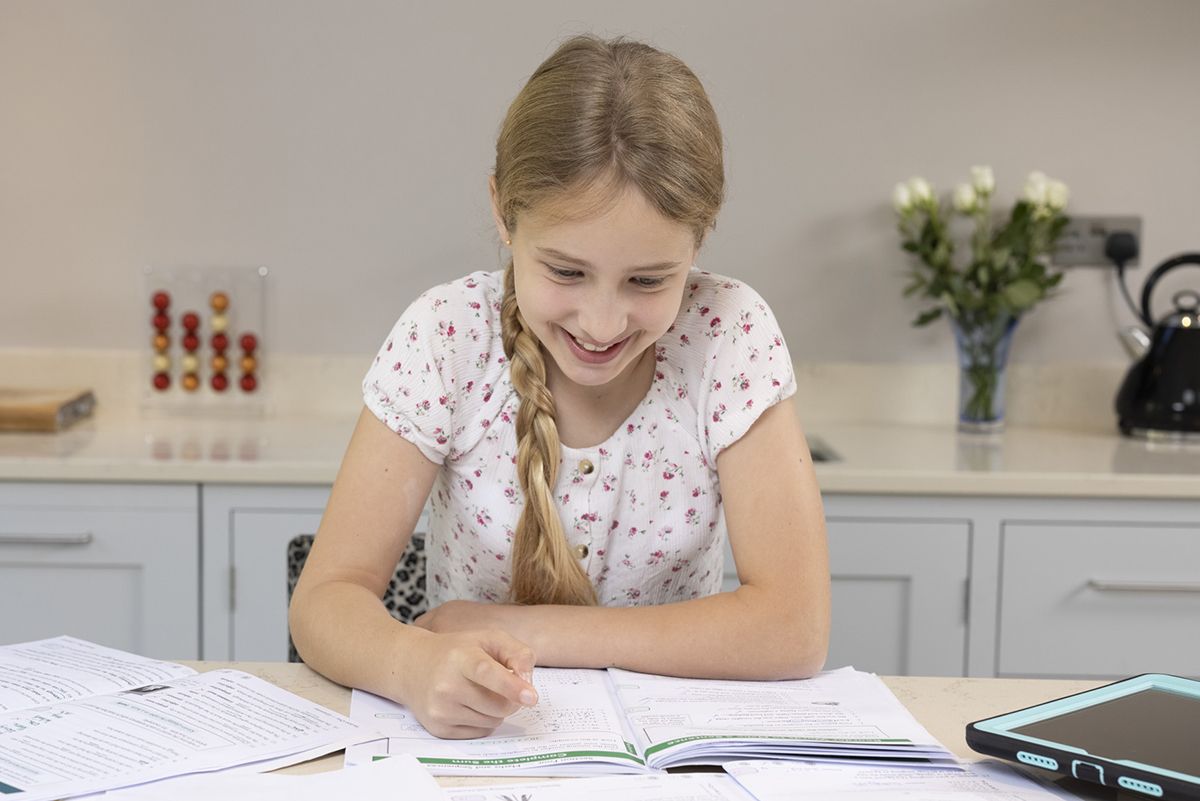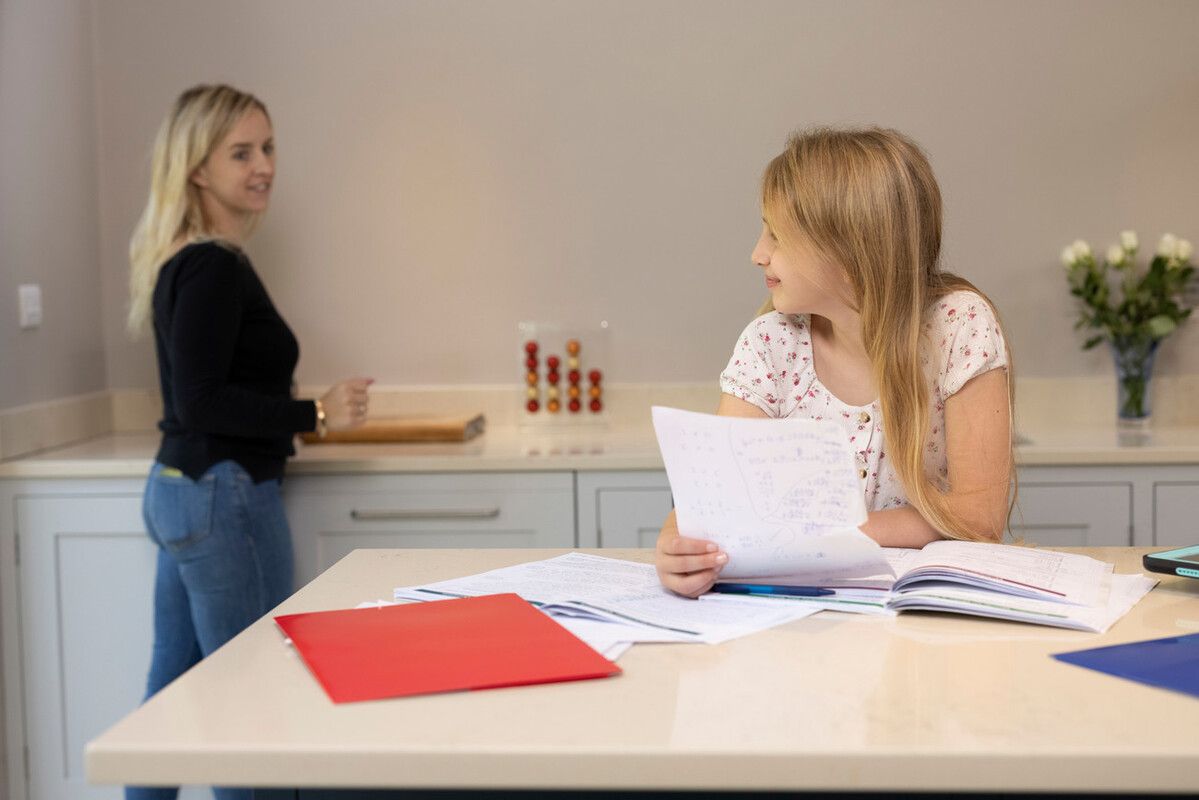
Article July 15, 2023
Top tips to deal with exam result anxiety
As we enter the GCSE and A Level exam period, you're not alone if your child is experiencing anxiety. In fact, our new research shows that a staggering 93% of parents in the UK say their child has felt stressed or anxious about exams. For many, that sense of fear and worry also extends to everyday schoolwork and termly grades.
One of our own students, Louise, struggled to keep up in lessons when she was at mainstream school because of her dyslexia. “This made me anxious,” says Louise, “and affected my self-esteem.”
Before she joined King’s InterHigh, Millie’s anxiety could also “permeate her whole day,” according to her mum, Sally. With the daily pressures of anxiety and autism, Sally explains that Millie “wouldn’t be able to focus on the teacher’s tasks or her own learning.” Alumnus Rosie, meanwhile, was told at her previous school that she would only be allowed to sit half the GCSEs she wanted to after her anxiety disorder affected her attendance.
If school is getting your child down, you don’t need to suffer in silence. In this guide, we’ll break down how you can help your child with their academic anxiety — from spotting the signs to addressing them at home to seeking professional help.
Understanding academic and exam result anxiety
Academic anxiety is the stress, worry, and fear that many students feel around their schoolwork, grades, and assignments. Similarly, exam anxiety causes students to feel excessive distress about their GCSEs, A Levels and IB results.
These anxieties sometimes pass on their own as school pressures ease up. Unfortunately, however, they can also have a big effect on wellbeing for many young people, causing problems like low self-esteem and difficulty keeping up with everyday life. Academic anxiety can quickly become a vicious cycle too — the more preoccupied your child is with doing well, the harder it is to focus and learn, causing grades to drop even further.
Does my child have anxiety, or are they just stressed?
It’s normal to feel stressed over exams and grades every once in a while, but serious anxiety is often more intense and longer-lasting, interfering with your child’s daily life.
If you’re worried that your child may be getting too anxious about school, here are some signs to look out for:
- Difficulty concentrating
- Unexplained headaches and other pains
- Trouble sleeping or eating
- Irritability and mood swings
- Social withdrawal
- Repeated procrastination
- Obsessive perfectionism
In serious or prolonged cases, academic anxiety can even lead to school avoidance or panic attacks.

What causes exam result anxiety?
One of the reasons why school and, in particular, exam result-related anxieties are so common is because they have so many potential causes and triggers. For example, students may feel a sense of academic anxiety for any of the following reasons:
- High academic expectations from family and teachers
- Competitive school environments and peer pressure
- The yearly increase in course difficulty
- Struggles to stay organised, prepared, and on-time
- A lack of support from teachers and school
Exam anxiety often has similar root causes, but on top of these struggles, students may be dealing with any of the following:
- Fear of failing exams and not making it into university
- Getting a bad grade on a previous exam
- Packed revision schedules and last-minute study
- Test conditions, from short time limits to struggles understanding question structure
How learning differences impact anxiety
Neurodivergent students with ADHD and autism, as well as learners with other special educational needs and disabilities (SEND), often have their own anxiety triggers to contend with too. Many of these learners already experience difficulty focusing, staying organised, communicating, and more. Some may even feel misunderstood and unsupported in mainstream schooling. This can all exacerbate the existing stress around school.
How to support your child with exam result anxiety: 5 top tips
Thankfully, there are many ways you can help your child tackle their anxieties become more positive, not just around exam result season but throughout their time at school. If you’re not sure where to start, here are five of our tips for families.
1. Encourage healthy study habits
Trying to study round-the-clock often does more harm than good. Here are some study habits that are both effective and helpful in reducing anxiety:
- Set a study schedule that’s manageable to follow, with allocated time for breaks and relaxation.
- Break tasks down into smaller parts to reduce overwhelm.
- Use active learning strategies (like summarising in your own words or teaching material to someone else) to boost confidence in understanding.
2. Create a supportive home environment
When school is stressful, home can be a safe haven. Some ways you can help your child’s wellbeing at home include:
- Encourage your child to open up and reassure them that there are ways to feel less stressed.
- Celebrate your child’s efforts to boost their self-esteem and motivation.
- Create a balanced lifestyle, including regular exercise, healthy eating, and solid sleep.
- Set up a quiet study space to reduce distractions, which can be especially helpful for neurodivergent students.
3. Encourage resilience and confidence
In general, helping your child develop a positive mindset can empower them to face academic challenges without excessive fear or worry. Try some of the following tips:
- Remind your child that problems can be solved, and that challenges in school are not insurmountable obstacles.
- Encourage a growth mindset, presenting mistakes as opportunities for learning rather than signs of inadequacy.
- Challenge irrational worries with cognitive behavioural techniques (for example, you’re unlikely to fail an upcoming exam if you’ve been doing well with all the content in class).
4. Practice mindfulness
Mindfulness and relaxation techniques can be powerful tools for managing all types of anxiety, including academic worries. Here are some techniques that can help your child stay present, reduce stress, and feel positive:
- Try breathing exercises to centre your child’s thoughts and calm their mind
- Take nature walks to disengage with anxious thoughts and enjoy a sense of peace.
- Start journalling; despite being old-school, this is great for children who struggle to express themselves verbally.
5. Try online resources
These days, there are so many flexible, personalisable online resources out there to help students cope with exams and schoolwork, which all reduces feelings of academic anxiety. If you’re not sure where to start, here are some of our recommendations:
- Educational websites: Learning platforms like Khan Academy are great tools for helping students learn at their own pace, while sites like Quizlet help students revise more effectively. These tools can reduce the pressures to keeping up with learning and study.
- Organisational tools: Try apps like Google Calendar or Todoist to help your child manage their time and set small goals they can tick off with confidence. This is great for reducing anxiety around homework deadlines and examinations.
- Relaxation apps: Headspace and Calm are two great mobile phone apps that provide children with guided meditation and mindfulness exercises, which can help them relax when they’re feeling particularly stressed.

Getting more help for your child’s exam result anxiety
Sometimes, a child’s anxiety is simply too severe for families to tackle alone. If your child is still struggling even with the tips above, it could be time to seek out more professional help.
How to approach your child’s school
Schools can play a pivotal role in tackling academic anxiety. Remember, your child’s school isn’t just a place of learning — staff are also there to foster a safe and supportive environment. Teachers can use several strategies to help your child in the classroom, so don’t be afraid to ask for their help.
- Set up a meeting: Request a meeting with your child’s teacher, the school’s pastoral lead, or the SENCO (Special Educational Needs Coordinator). Their role is to ensure every child gets the support they need, so they’re the best people to discuss your concerns and help you with possible strategies.
- Ask about IEPs: Schools can develop IEPs (Individual Education Plans) to support children with various needs, including anxiety. These documents outline your child’s goals for the school year, along with the support the school needs to provide to help meet them.
- Ask about exam accommodations: Access Arrangements are adjustments to usual exam conditions, and many students in the UK with anxiety and learning differences are eligible for them. These adjustments include options like extra time on tests, having a scribe or reader with you in exams, and more. Ask your child’s school whether they’ll be eligible to apply for any of these arrangements.
- Leverage school resources: Many schools have their own mental health resources, from counselling services to stress workshops, that can help with academic anxiety. Ask about these resources and how your child can access them.
How to get professional mental health support
In cases of severe academic anxiety, you may need to ask your child’s GP for more help. GPs are the first port of call for concerns like these, as they can refer your child for treatment such as counselling or for a specialist appointment.
Online schooling: How we help at King’s InterHigh
For some students with academic anxiety, the traditional school environment simply may not be the best place to learn.
Students who are anxious about keeping up with the typical pace, for example, often benefit from a more personalised or flexible style of learning. Neurodivergent learners who struggle with classroom distractions may need a calm, quiet environment that helps them focus better.
At King’s InterHigh, we welcome numerous students each year who’ve been struggling with anxiety. Sally told us that after Millie joined King’s InterHigh, she was finally able to start her day “in a calm and peaceful way, whereas before she would be in absolute turmoil.” We offer a range of adjustments for students with SEND, and we initially accommodated Millie with exemption from homework tasks to manage her anxiety. But, Sally says, “it wasn’t long before she wanted to give homework a go.”
For Louise, online schooling was an opportunity to finally learn at her own pace and avoid comparing herself to classmates. She says that the flexibility of King’s InterHigh lessons “really helped me feel much less pressured and… become more confident in my learning.”
Meanwhile, despite being told she could only study four GCSEs at her mainstream school, Rosie was able to achieve eight strong GCSE grades with us at King’s InterHigh. Rosie later went on to study biomedicine at Queen Mary University of London, with the aim of becoming a doctor one day.

At King’s InterHigh, we combine a top-quality education with the flexibility to learn in a way that works for every student. For example, while our expert teachers deliver all lessons live, we also give students 24/7 access to recordings of every class. This has numerous benefits for anxious learners, from helping them keep up with their courses to helping them revise for exams. As with Millie, we can also work with families to set up accommodations that help severely anxious students rebuild their confidence around learning.
Our innovative learning model includes initiatives like cycle testing, which does wonders in reducing anxiety ahead of GCSEs, A Levels, and IBDP exams. Plus, students are always welcome to join exam stress workshops, vent sessions, and more to support their wellbeing.
King’s InterHigh is the school where learning revolves around you and every student is supported to thrive — no matter their needs.
If you’d like to discuss your child’s needs and how King’s InterHigh could support them to thrive happily, book a discovery call with our helpful admissions team.




















